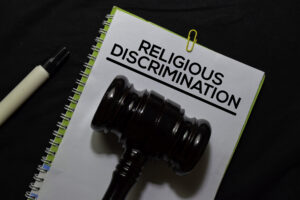The Supreme Court rules that defense standard set forth in Hardison has been erroneously interpreted by lower courts for nearly 50 years.
Background of Groff v. DeJoy

The case, Groff v. DeJoy, arose when Gerald Groff sought to be excused from working on Sundays to observe the Sabbath. Groff is a United States Postal Service employee and Evangelical Christian who believes that Sundays should be devoted to worship and rest, not “secular labor.”
In 2012, when Groff began working for the USPS, his assignment did not typically require Sunday work. Things changed in 2013, when USPS and Amazon made an agreement to facilitate Sunday deliveries of Amazon packages. In 2016, the USPS signed a memorandum of understanding that set out how Sunday and holiday parcel delivery would be handled. After the memorandum of understanding was adopted, Groff was told that he would be required to work on Sundays. He then sought and received a transfer to Holtwood, a smaller rural USPS station that had only seven employees and that, at the time, did not make Sunday deliveries. But in March 2016, Amazon deliveries began there as well.
Because Groff refused to work on Sundays, USPS made other arrangements. During the peak season, Sunday deliveries that would have otherwise been performed by Groff were carried out by the rest of the Holtwood staff, including the postmaster, whose job ordinarily does not involve delivering mail. During other months, Groff ’s Sunday assignments were redistributed to other carriers assigned to the regional hub.
Groff continued to receive “progressive discipline” for failing to work on Sundays until his resignation in 2019. After resigning, Groff filed suit, alleging that USPS failed to accommodate his religion under Title VII of the Civil Rights Act of 1964.
The case reached the Philadelphia-based Third Circuit in 2022. Applying Trans World Airlines, Inc. v. Hardison, 432 U. S. 63 (1977), the Third Circuit affirmed summary judgment in favor of the USPS, concluding that excluding Groff from Sunday work created an “undue hardship” by “impos[ing] on his coworkers, disrupt[ing] the workplace and workflow, and diminish[ing] employee morale.”
The Supreme Court holds that the Third Circuit was wrong about what “more than a de minimis cost” means in the accommodation context.
Although labeled as “undue hardship,” the Third Circuit, relying on Hardison, ruled that “[a]n ‘undue hardship’ is one that results in more than a de minimis cost to the employer.” Groff v. Dejoy, 35 F.4th 162, 174 (3d Cir. 2022). This interpretation equates “undue hardship” standard to “more than a de minimis cost” standard of religious accommodation defense.
The Supreme Court in Groff v. DeJoy, decided on June 29, 2023, now clarifies that showing “more than a de minimis cost” does not suffice to establish “undue hardship” under Title VII. Rather, “undue hardship” is shown when a burden is substantial in the overall context of an employer’s business.
This unanimous decision, authored by Justice Alito, held that the statutory language, in common parlance, did not justify a standard under which even a trivial cost would be sufficient to deny accommodation. Under the clarified standard, “an employer must show that the burden of granting an accommodation would result in substantial increased costs in relation to the conduct of its particular business.” What matters more is that “courts must apply the test in a manner that takes into account all relevant factors in the case at hand, including the particular accommodations at issue and their practical impact in light of the nature, “size and operating cost of [an] employer.”
EEOC regulations and guidelines are subject to modifications under clarified “undue hardship” standard.
We expect that the EEOC will modify its regulations and guidance in light of the Supreme Court’s clarification for the standard. While the Supreme Court decision suggested that EEOC’s current guidance is unlikely to be affected by the Groff decision, the Court declined to ratify the whole body of EEOC’s prior interpretation of the “undue hardship” standard. Therefore, since EEOC regulations have not yet been construed in accordance with the standard as clarified by the Supreme Court, those regulations may be subject to change based on the Court’s ruling.
A coworker’s animosity to a particular religion cannot be considered “undue hardship.”
Moreover, the Groff decision underscored that a coworker’s animosity to a particular religion, to religion in general, or to the very notion of accommodating religious practice is not “cognizable to factor into the undue hardship inquiry.”
What’s next?
The Supreme Court remanded this case to the Third Circuit, which will likely remand the case to the district court for further development of the evidentiary record required to evaluate the USPS’s “undue hardship” defense in light of the Supreme Court’s opinion. As the Supreme Court noted, USPS may prevail, but only if it appropriately demonstrates Groff’s request not to work on Sundays imposes an undue burden on it. Notably, the Supreme Court remarked that for accommodation requests like Groff’s, it would not be enough for an employer to conclude that forcing other employees to work overtime would constitute an undue hardship. Consideration of other options, such as voluntary shift swapping, would also be necessary.
StraightforWARD Legal Advice:
The hasty rejection of an employee’s request for religious accommodation is perilous. Employers that deny a religious accommodation must be prepared to demonstrate that granting an accommodation would result in “substantial increased cost” in relation to the conduct of its particular business. Because the “undue hardship” standard is context-specific, and is construed “in the commonsense manner,” employers should carefully consider the nature, size, and operating cost of their own businesses when making accommodation decisions.
Ward Law’s employment lawyers are available to assist employers with religious accommodation compliances and defenses under the newly clarified standard. If you have questions, please contact Mark Stephenson at (215) 647-6614 or mstephenson@thewardlaw.com.
